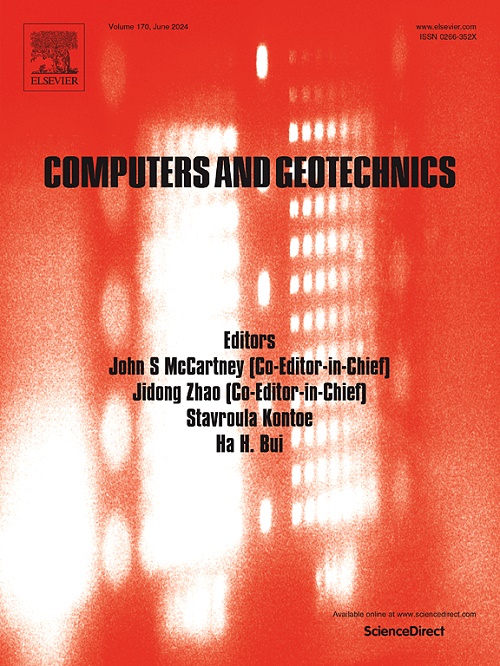The effect of particle size distribution on the collapse of wet polydisperse granular materials
IF 5.3
1区 工程技术
Q1 COMPUTER SCIENCE, INTERDISCIPLINARY APPLICATIONS
引用次数: 0
Abstract
Low-saturation liquid-containing granular materials are commonly encountered in both natural and industrial settings, where interstitial liquids significantly affect the motion of particles, while particle size polydispersity plays a crucial role in determining the level of system cohesion. In this study, the collapse of wet polydisperse granular columns is numerically investigated based on the developed discrete element model, with corresponding dam-break experiments performed to validate our numerical model and methodology. The dependence of the dynamics and flow mobility on particle size distribution is primarily examined, and the underlying mechanisms are also explored by analyzing particle path lengths and average fidelity. Building upon the effective Bond number proposed using the mixing theory, a macroscopic cohesion parameter at the material scale is defined by considering the dependence of the collapse on the system size effect. The relevance of this cohesion parameter in describing different wet polydisperse granular collapses is further validated based on our designed experimental tests and DEM simulations. The approach of constructing the cohesion parameters at different scales can be extended to characterize cohesion effects in more complex wet polydisperse granular flows and describe their associated rheological behaviors.
粒度分布对湿式多分散颗粒材料塌陷的影响
低饱和度含液颗粒材料在自然环境和工业环境中都很常见,其中的间隙液体对颗粒的运动有很大影响,而颗粒尺寸的多分散性在决定系统内聚力水平方面起着至关重要的作用。在本研究中,基于所开发的离散元素模型,对湿式多分散颗粒柱的坍塌进行了数值研究,并进行了相应的溃坝实验,以验证我们的数值模型和方法。主要研究了动力学和流动流动性对颗粒粒度分布的依赖性,并通过分析颗粒路径长度和平均保真度探讨了基本机制。在利用混合理论提出的有效邦德数的基础上,通过考虑塌缩对系统尺寸效应的依赖性,定义了材料尺度上的宏观内聚力参数。根据我们设计的实验测试和 DEM 模拟,进一步验证了该内聚力参数在描述不同湿多分散颗粒塌陷方面的相关性。构建不同尺度内聚力参数的方法可扩展用于描述更复杂的湿式多分散粒料流中的内聚力效应,并描述其相关的流变行为。
本文章由计算机程序翻译,如有差异,请以英文原文为准。
求助全文
约1分钟内获得全文
求助全文
来源期刊

Computers and Geotechnics
地学-地球科学综合
CiteScore
9.10
自引率
15.10%
发文量
438
审稿时长
45 days
期刊介绍:
The use of computers is firmly established in geotechnical engineering and continues to grow rapidly in both engineering practice and academe. The development of advanced numerical techniques and constitutive modeling, in conjunction with rapid developments in computer hardware, enables problems to be tackled that were unthinkable even a few years ago. Computers and Geotechnics provides an up-to-date reference for engineers and researchers engaged in computer aided analysis and research in geotechnical engineering. The journal is intended for an expeditious dissemination of advanced computer applications across a broad range of geotechnical topics. Contributions on advances in numerical algorithms, computer implementation of new constitutive models and probabilistic methods are especially encouraged.
 求助内容:
求助内容: 应助结果提醒方式:
应助结果提醒方式:


